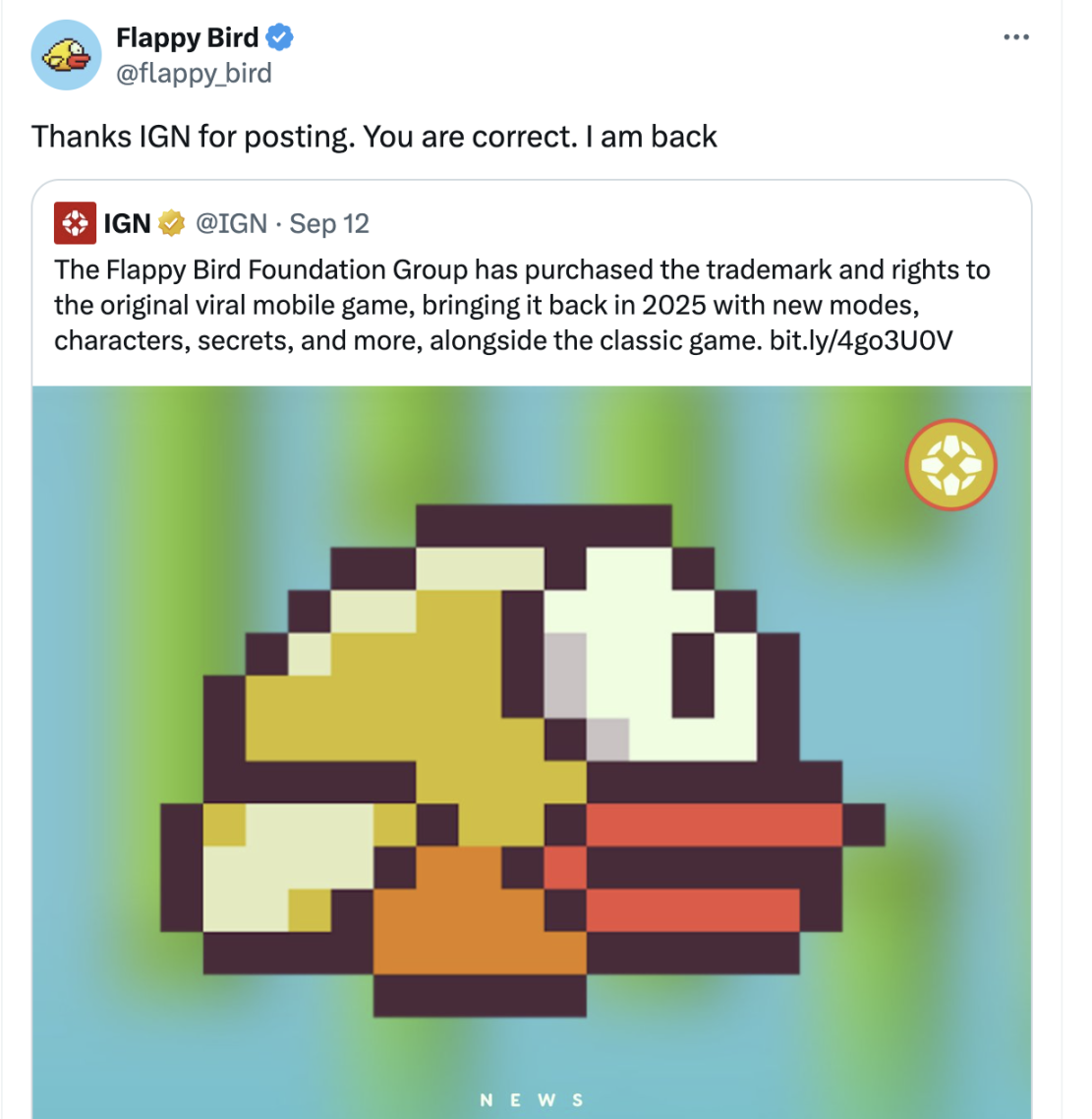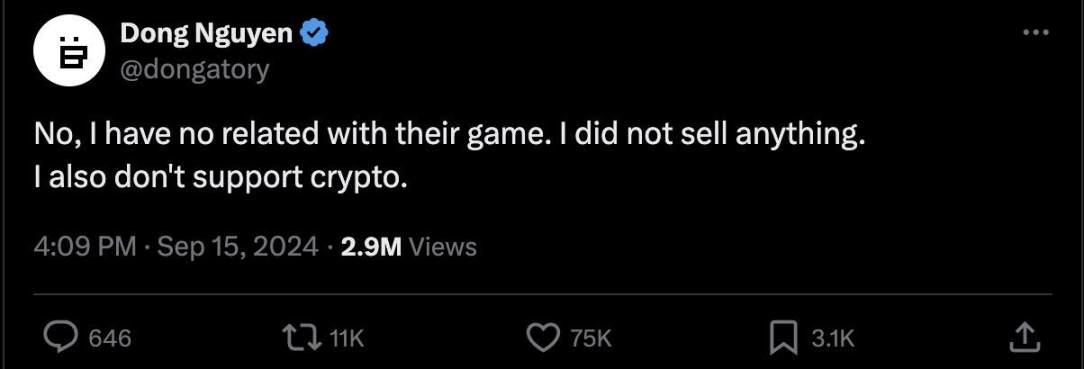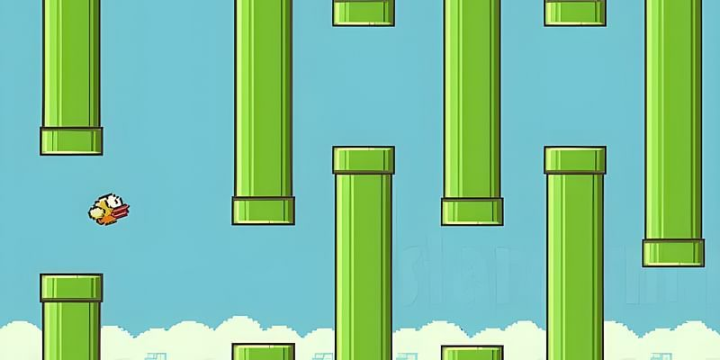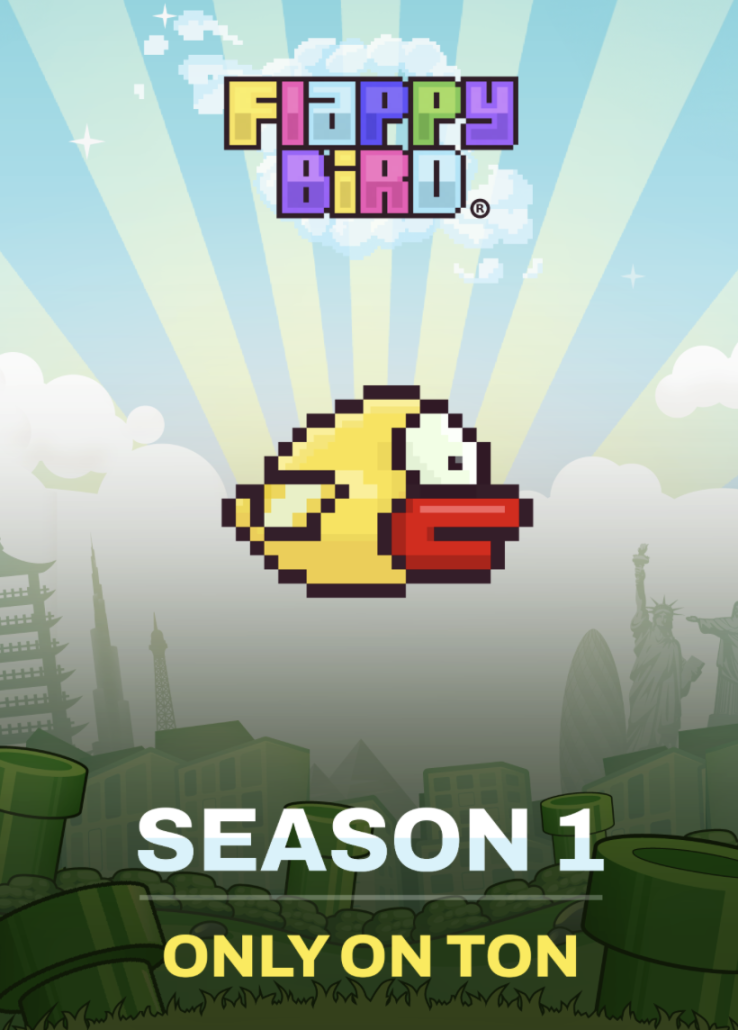The well-known game IP is both a gimmick and a burden, and the traditional players' resistance to Web3 and cryptocurrency is not a new phenomenon. On the other hand, with the dissatisfaction of the community after the airdrop of several major projects in the Ton ecosystem, it is also unknown whether users can still have confidence to participate.
Author: Zen, PANews
On September 12, the well-known entertainment and game media website IGN announced that the Flappy Bird Foundation had purchased the trademark and copyright of the viral mobile game "Flappy Bird" and will relaunch it in 2025 with new modes and characters added to the classic game. On the same day, the Flappy Bird Foundation also posted on X platform, saying "I AM BACK!!", but did not disclose specific details about the game. Nevertheless, it immediately attracted attention in the gaming community, with the views of the post quickly exceeding 7 million, demonstrating the game's influence.
"Official announcement! Flappy Bird has landed on Telegram!" On September 16, the Flappy Bird Foundation announced on X platform that the new game would officially debut on the Ton blockchain network, which is currently popular with the Web3 version. However, the attention from the outside world to this news has significantly decreased—many traditional players had already learned from social media before this that the "new Flappy Bird" is highly related to cryptocurrency, seemingly dampening their interest.

Controversy over the "suspicious" comeback
"Flappy Bird" has become one of the most cloned games in the past decade of silence, and its return has sparked the interest of many old players. Network security researcher Varun Biniwale was the first to research the new game. In an article he subsequently published, he stated that the return of "Flappy Bird" was somewhat suspicious.
The article pointed out that the original developer of "Flappy Bird" had no connection to the new game, and the project website contained elements of cryptocurrency and "Web 3.0". He also dug up a page that was seemingly deleted at the end of last year, which advertised the game as follows: "The legendary Flappy Bird is back, and it will fly higher on Solana than ever before, because it has entered Web3.0." This indicates that when the Solana ecosystem was booming at the end of last year, the Flappy Bird Foundation had intended to release the game in that ecosystem rather than the current Ton.
After the news of the return of "Flappy Bird" spread, Dong Nguyen, the original developer who had not posted content on the X platform for a long time, clarified after 7 years that he had no connection with the "new Flappy Bird". He did not sell anything and did not support cryptocurrency.

In addition, old players of "Flappy Bird" also left community notes on the content posted by the Flappy Bird Foundation, reminding other players that this new game is not the same as the original game, and the wording was rather sharp. For example, under the announcement of Flappy Bird landing on Telegram, there was a note reminding: "This seems to be a cryptocurrency scam, using fans' nostalgic emotions for the game to sell NFTs."
Regarding the trademark issue of the game, some court documents from the United States Patent and Trademark Office show that a US company named Gametech Holdings filed a lawsuit against Dong Nguyen for the trademark of the game. It turns out that because Flappy Bird had been dormant for too long, the game was considered abandoned, so Gametech Holdings could obtain the trademark rights to the game for free, and Nguyen, who was criticized by old players for "doing nothing", never attempted to reclaim the trademark. After obtaining the trademark, Gametech Holdings eventually transferred it to the so-called Flappy Bird Foundation.
How popular was "Flappy Bird"?
"Flappy Bird" is a casual mobile game released in May 2013, developed by Vietnamese developer Dong Nguyen. The mechanism of this viral game is very simple—players only need to control a bird named Faby, click the screen to control the bird's flying height to avoid hitting pipes, and the game score depends on the number of pipes they pass through. Nguyen completed the game in just two or three days.

In early 2014, just like the later WeChat mini-games "Tiao Yi Tiao" and "Yang Le Ge Yang" that quickly became popular in a short period of time, "Flappy Bird" suddenly became popular and became the most downloaded free iOS game in the App Store at the end of January. During this period, "Flappy Bird" could earn $50,000 per day through in-app ads and sales.
On February 10, 2014, "Flappy Bird" was removed from the App Store and Google Play. According to Dong Nguyen himself, he felt guilty for the addictive nature and excessive use of the game. With great popularity comes great controversy, and the then-popular "Flappy Bird" actually faced many criticisms, including but not limited to being too difficult, allegations of graphics and game mechanics being copied, and being highly addictive.
However, even after "Flappy Bird" was removed, it did not help some players "quit the addiction", and this even allowed phones with the game installed before it was removed to be sold online at high prices. The "clone version" of "Flappy Bird" that was urgently put back on the App Store was also popular, but Apple and Google removed it from the app store because the game was too similar.
Airdrop, but absolutely no NFT sales!
Perhaps in response to the questioning of "selling NFTs using fans' nostalgic emotions for the game", the Flappy Bird Foundation has recently emphasized multiple times that the new game "will never have NFTs". The players' concerns are not unfounded. It is understood that the leader behind the Flappy Bird Foundation is game designer Michael Roberts, who is also the founder of the NFT project "Deez", which was launched in September 2021.
According to the Flappy Bird Foundation, when playing the game through Telegram, players can choose to "integrate Web3", but users can also choose to opt out. In addition, the future versions of the game released on mobile platforms will not have encryption features and will remain permanently free.
According to Cointelegraph, the new version of the game will make money through in-app transactions, and its in-app purchase plan "includes buying more energy and items that can change the flight physics". In addition, a spokesperson for the production team behind the new game said, "The game will also earn revenue from in-game ads," and he stated that in-game ads are "completely optional for players" and provide benefits such as score multipliers for players.
Currently, the game is running a "Flap to Earn" promotion and promises to airdrop $FLAP tokens in the future. With the Ton ecosystem's most popular projects Catizen and Hamster Kombat completing airdrops one after another, the Web3 version of "Flappy Bird" entering the scene at this time is significant. The success of the original game and the accumulated player base indeed provide ample confidence for the subsequent development of the new version.

However, on the one hand, well-known traditional game IPs are both a gimmick and a burden, and the resistance of traditional players to Web3 and cryptocurrency is not a new phenomenon. On the other hand, with the dissatisfaction of the community after the airdrop of several major projects in the Ton ecosystem, it is also unknown whether users can still have confidence to participate.
免责声明:本文章仅代表作者个人观点,不代表本平台的立场和观点。本文章仅供信息分享,不构成对任何人的任何投资建议。用户与作者之间的任何争议,与本平台无关。如网页中刊载的文章或图片涉及侵权,请提供相关的权利证明和身份证明发送邮件到support@aicoin.com,本平台相关工作人员将会进行核查。




